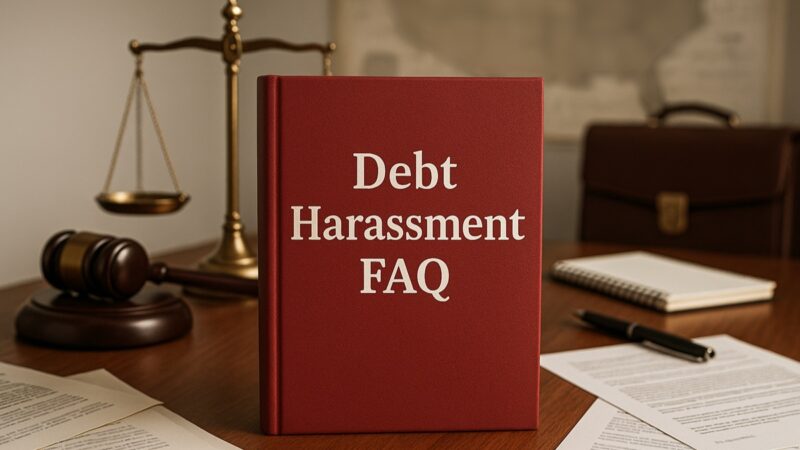- Lemberg Law
- FDCPA – Debt & Credit Complaints
- Debt Collection FAQ’s
Debt collection harassment robs you of your time, energy, and peace of mind. Lemberg Law’s debt collection FAQ outlines all of the information you need to assert your rights and fight back against abusive debt collectors.

The basics
First things first. It’s important to understand the players: creditors and collection, as well as collection agencies and how they work. You might be interested in the different actions debt collectors can take and the implications of ignoring debt collectors. Beyond that, it may be worth your while to learn more about the two primary laws that protect you from debt collector harassment:
Collection calls
Collection calls are the bane of every consumer’s existence. As such, they raise several questions, including the number of times a collector is allowed to call, when they can call, whether they can call you at work, and – most importantly – how to get collectors to stop calling. Our clients often have even more specific questions, such as:
- Can a Debt Collector Call My Boss?
- Can a Debt Collector Call My Cell Phone?
- Why Do Debt Collectors Call When I Have No Debt?
- Can Debt Collectors Call on Sunday?
- Is it Illegal for Debt Collectors to Call Family Members?
- Can Debt Collectors Tell Others About Your Debt?
Other collection activities
Debt collection calls are a central tactic that agencies use to contact consumers. But they’re just one piece of the debt harassment puzzle. Debt collection agencies have been known to threaten, mislead, and even insult consumers. People are understandably concerned about the potential for collectors to confront them at work, or under these conditions:
- Can a Debt Collector Swear at Me?
- Can a Debt Collector Lie to Me?
- Can a Debt Collector Pretend to be a Lawyer?
- Can a Debt Collector Lie about Who They Are?
- Can a Debt Collector Come to My House?
- Can a Debt Collector Knock on My Door?
- Can a Debt Collector Come to My Door with a Baseball Bat?
- Debt Collector Threatening to Serve Papers?
- Fake Summons from Debt Collector?
- Can a Debt Collector Contact me on Social Media?
- Can A Debt Collector Threaten Me With Criminal Charges Or Imprisonment?
- What are Things A Debt Collector Cannot Lie About?
- What Is a Debt Collection Validation Notice?
- What Kind of Voicemails Can Debt Collectors Leave?
- What Are Debt Collection Opt-Out Notices?
- Senior Debt Harassment
Credit implications
It’s understandable that consumers are concerned about the impact that debt collection has on their credit reports. Learning about the timing of when collection agencies report to credit bureaus can be helpful, as can discovering how long collections stay on your credit report or if debt collectors can threaten you with reporting false credit information.
Debt collection lawsuits
There are circumstances under which debt collectors can sue you, so it’s important to understand when they’re allowed to do so and what to do if you’re sued. You should also know that you can sue a debt collection agency for harassment. Specific questions our clients have include:
- After How Many Years do Debts Expire?
- Can a Debt Collector Collect After 10 Years?
- How to Answer a Summons for Debt Collection
Wage garnishment
If a debt collector obtains a legal judgment against you, then you may be subject to wage garnishment. This raises a host of other questions, such as:
- Can a Debt Collector Garnish a Joint Bank Account?
- Can Debt Collectors Garnish Your Wages?
- How to Stop Wage Garnishment from a Debt Collector?
- Can a Creditor Garnish My Wages After Seven Years?
Taking action
No one wants to feel powerless when dealing with debt collectors. Consumers should be informed about how to find out if you have a debt in collection, how to tell whether or not a debt collector is legitimate, how to deal with debt collectors, and how to stop debt collections from calling. Other things you may be able to do include:
- How to Find Out What Debt Collectors You Owe
- How to Dispute A Debt
- When to Tell Debt Collectors That You Refuse to Pay Deceased Relatives Debts
- How To Fight Back Against Illegal Debt Collector Harassment
- How to Fight Back Against Debt Collector Embarrassment
- How To Fight Back Against Debt Collectors Shaming Tactics
- State Specific Debt Collection laws
- What is Wrongful Repossession
See also how to stop Student Loan Debt Collection Harassment, and general issues about Student Loans and debt.
